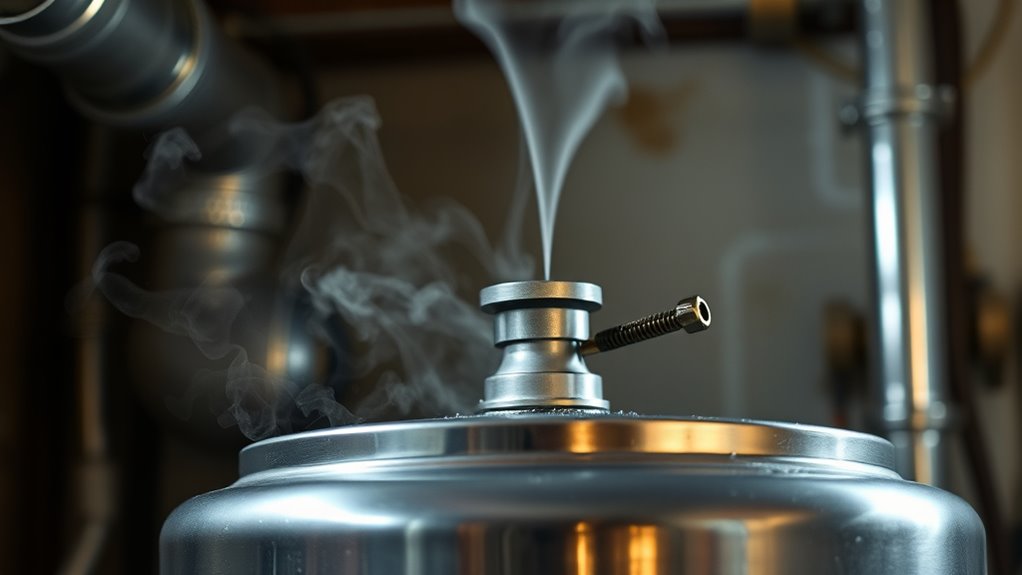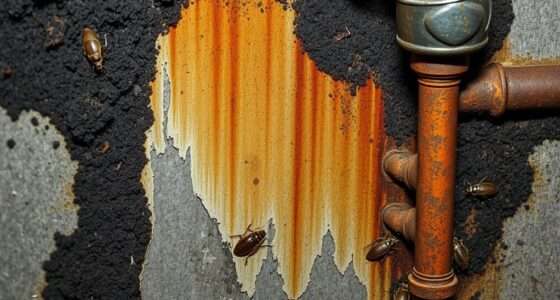Regularly flushing your water heater is essential to remove sediment buildup, which can reduce efficiency, cause noisy operation, and shorten its lifespan. Neglecting this task leads to higher energy bills and costly repairs over time. Addressing issues early helps prevent leaks, rust, and corrosion, saving you money and hassle. Keeping your home safe and efficient doesn’t have to be complicated—keep going to discover simple steps to improve system performance and avoid overlooked problems.
Key Takeaways
- Flushing removes sediment buildup, maintaining water heater efficiency and preventing early tank corrosion.
- Regular flushing extends water heater lifespan and reduces energy costs caused by sediment insulation.
- Sediment accumulation can cause noisy operation and reduce hot water supply, signaling the need for maintenance.
- Proper maintenance, including flushing, prevents leaks and costly repairs, ensuring home safety and comfort.
- Routine care like flushing supports overall home health by improving appliance performance and energy efficiency.
The Importance of Flushing Your Water Heater Regularly
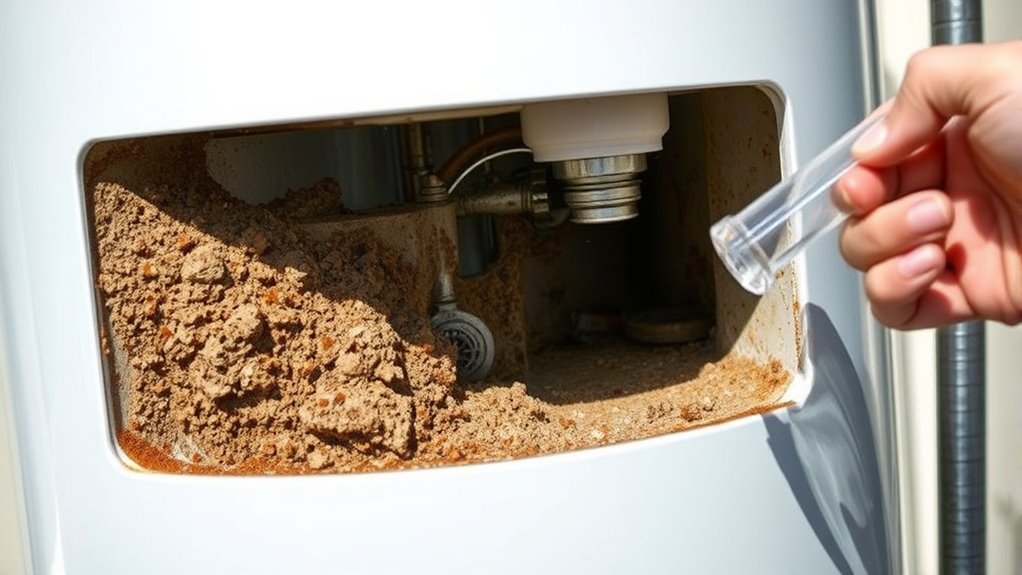
Flushing your water heater regularly is essential to keep it running efficiently and extend its lifespan. Proper tank maintenance helps remove sediment buildup that can clog the system and reduce performance. Over time, minerals from your water settle at the bottom of the tank, affecting water quality and making your heater work harder. Regular flushing prevents these deposits from accumulating, which improves energy efficiency and prevents early failure. It also ensures your hot water remains clean and safe for everyday use. Additionally, maintaining your water heater aligns with best practices for home care and helps avoid unnecessary repairs. By prioritizing routine tank maintenance, you protect your investment and maintain ideal water quality. Skipping this step could lead to costly repairs down the line, so make flushing a regular part of your home care routine.
Signs Your Water Heater Needs Immediate Attention

Your water heater may need immediate attention if you notice inconsistent or insufficient hot water, as this often signals a malfunction or sediment buildup. One vital sign is tank corrosion, which can cause leaks or water discoloration. Check for rust around the tank or on hot water fixtures. Additionally, if your heater produces strange noises or the hot water runs out quickly, it could point to an anode rod deterioration. The anode rod prevents tank corrosion, but over time, it wears down, leaving the tank vulnerable. If you see signs of corrosion or suspect the anode rod isn’t functioning properly, it’s essential to address these issues promptly to prevent costly damage or complete heater failure. Regular inspections in scenic camping environments can help maintain your water heater’s performance and longevity.
How Sediment Buildup Affects Efficiency and Longevity

Sediment buildup inside your water heater can considerably reduce its efficiency and shorten its lifespan. As minerals settle at the bottom, they form a layer that forces the heater to work harder, wasting energy. This sediment acts like an insulator, decreasing heat transfer and raising your energy bills. Over time, the buildup can cause the tank to corrode faster, risking leaks or failure. Proper calibration of your heater can help optimize performance and prevent uneven heating.
Imagine this:
| Without Sediment | With Sediment |
|---|---|
| Heater heats water efficiently | Heater struggles, consumes more energy |
| Quiet operation | Noise and clanking from sediment |
| Longer lifespan | Premature wear and repair costs |
| Consistent hot water | Inconsistent temperature |
Regular flushing keeps sediment at bay, maintaining efficiency and extending your heater’s life.
Step-by-Step Guide to Flushing Your Water Heater
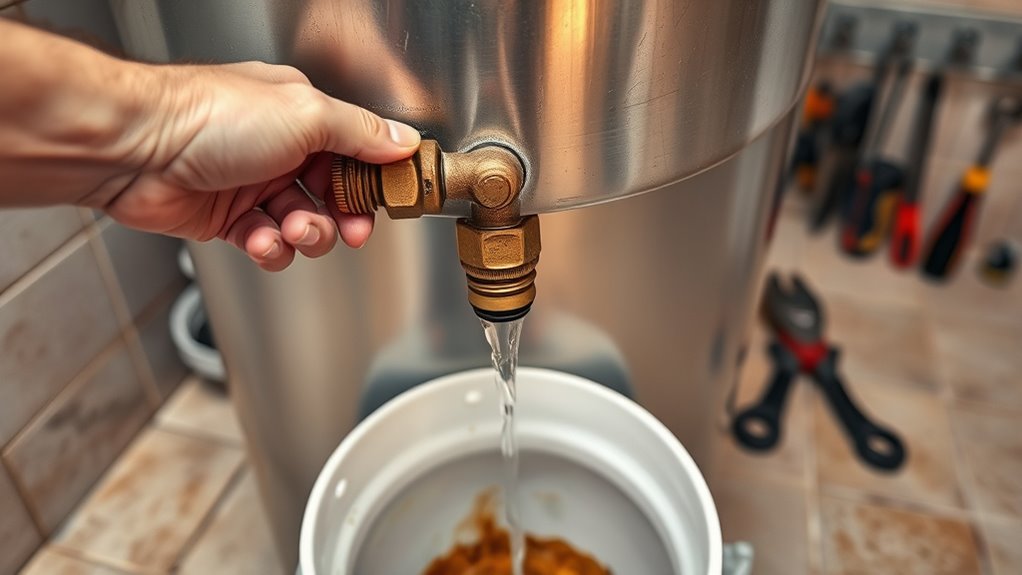
To guarantee your water heater operates efficiently and lasts longer, it’s important to regularly flush out sediment buildup. First, turn off the power supply or gas to the water heater. Next, shut off the cold water inlet valve. Attach a garden hose to the drain valve at the bottom of the tank and run it to a floor drain or outside. Open the drain valve and let the water flow out completely. To remove remaining sediment buildup, briefly turn on the cold water inlet to stir up sediments, then drain again. Once the tank is empty, close the drain valve, remove the hose, and turn the water supply back on. Finally, restore power or gas and check for proper operation. Regular flushing keeps your water heater running smoothly and helps prevent sediment accumulation, which can impair efficiency over time.
Other Key Appliances That Benefit From Routine Maintenance

Many household appliances perform better and last longer when you perform routine maintenance. Keeping up with maintenance schedules can extend the appliance lifespan and prevent costly repairs. For example, your refrigerator’s coils should be cleaned regularly to ensure efficiency. Washing machines need lint filters cleaned and hoses checked for leaks. Dishwashers benefit from periodic filter cleaning and spray arm inspections. HVAC systems require annual filter changes and duct checks. Even your garbage disposal needs occasional cleaning to prevent odors and clogs. Staying on top of these tasks saves energy, reduces wear and tear, and helps appliances run smoothly. Regular maintenance isn’t just about fixing problems; it’s about preventing them and keeping your home running efficiently. Additionally, understanding divorce guidance can help you navigate life changes more smoothly during stressful times.
Preventing Hidden Plumbing Problems Before They Escalate

Regularly inspecting your plumbing system can catch issues early before they turn into costly repairs. Focus on corrosion prevention by checking for signs of rust or corrosion on pipes, especially in humid areas. Proper pipe insulation helps prevent freezing and reduces temperature fluctuations that can cause pipe expansion and contraction. To stay proactive, consider this quick reference:
| Action | Benefit |
|---|---|
| Apply pipe insulation | Prevents freezing and reduces heat loss |
| Check for leaks | Avoids water damage and mold |
| Inspect for corrosion | Extends pipe lifespan |
| Maintain proper drainage | Prevents backups and clogs |
| Schedule routine checkups | Detects issues early |
Additionally, incorporating preventative maintenance into your routine can help identify potential problems before they become severe. Staying vigilant with these steps keeps your plumbing healthy and avoids hidden problems from escalating.
Seasonal Home Care Tips to Save Money Year-Round
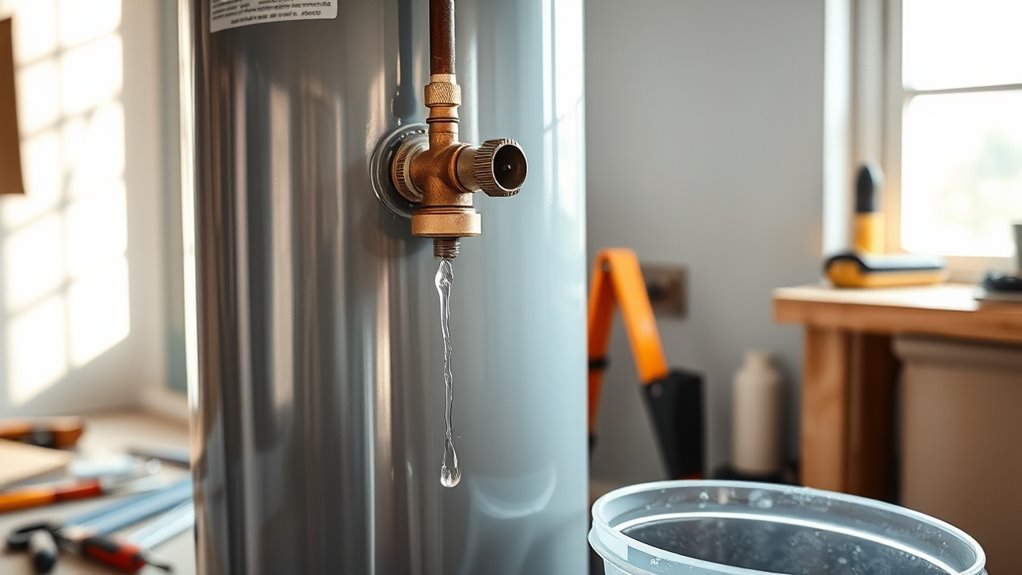
As the seasons change, taking steps to prepare your home for winter can save you money and prevent costly repairs. By sealing drafts and maintaining your heating system, you’ll boost energy efficiency and lower bills. These simple adjustments help you stay comfortable all year without overspending. Additionally, considering the use of air purifiers can improve indoor air quality, reducing allergens and pollutants that may worsen respiratory issues during the colder months.
Prepare for Winter Months
Preparing your home for winter not only keeps your family comfortable but also saves you money on energy costs. To maximize your water heater’s lifespan, assure you remove sediment regularly, which can clog the system and reduce efficiency. Proper preparation also involves sealing drafts, insulating pipes, and checking your heating system. Here are some tips to get ready:
- Insulate exposed pipes to prevent freezing
- Seal gaps around windows and doors
- Schedule a sediment removal for your water heater
- Cover vents and chimneys to improve efficiency
- Check your thermostat settings for ideal energy use
- Regular maintenance can extend the life of your appliances and improve overall home efficiency, especially when considering home care practices.
Prevent Costly Repairs
To prevent costly repairs, staying vigilant about seasonal home maintenance is essential. Proper tank insulation helps keep your water heater working efficiently and protects it from temperature fluctuations that can cause damage. Check that your water heater is correctly placed—away from drafts, direct sunlight, or areas prone to flooding. Good placement reduces strain on the tank and extends its lifespan. Additionally, insulating pipes connected to your water heater prevents heat loss and potential freezing issues, especially during colder months. Regularly inspecting for leaks or corrosion can catch problems early before they turn into expensive repairs. Utilizing proper placement techniques can further enhance the longevity of your water heater. Taking these simple steps ensures your water heater remains in good condition, saving you money and avoiding unexpected breakdowns. Preventive care now pays off in the long run.
Optimize Energy Efficiency
Maintaining your home’s energy efficiency throughout the year can considerably lower your utility bills and reduce your environmental impact. To do this, keep an eye on your water temperature settings to avoid unnecessary energy use. Lowering the temperature slightly can cut heating costs and prevent tank corrosion caused by excessive heat. Regularly insulate your water heater and pipes to minimize heat loss. Schedule annual maintenance to flush the tank, removing sediment buildup that impacts efficiency. Additionally, check for leaks and insulate any exposed pipes. These simple steps ensure your system runs smoothly, prolonging its lifespan and saving you money over time. Properly maintaining your water heater can help prevent costly repairs and improve overall efficiency.
Simple Tasks to Keep Your Household Running Smoothly
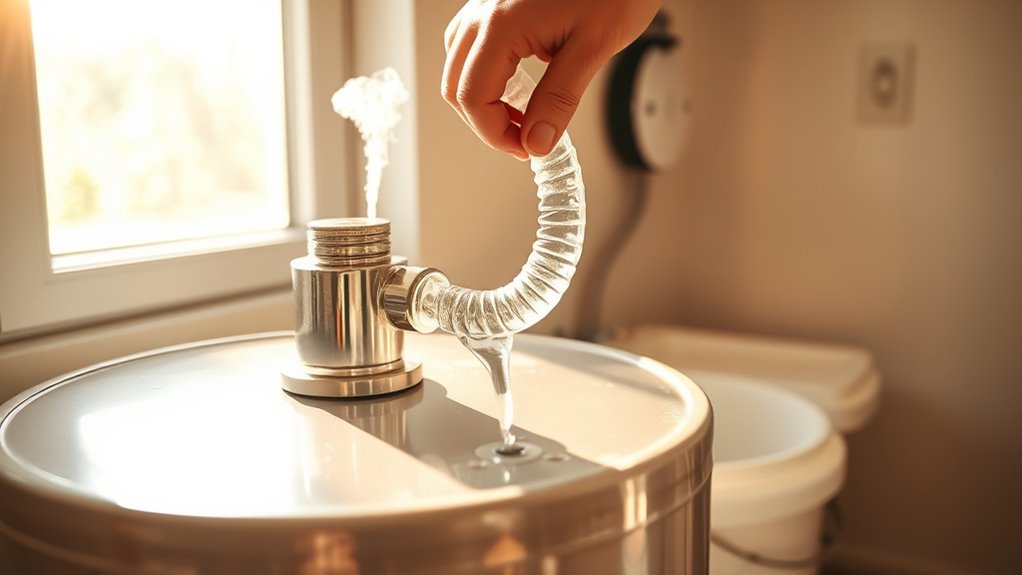
Keeping your household running smoothly is easier when you stay on top of a few simple tasks. Regularly changing filters, inspecting plumbing lines, and scheduling routine maintenance can prevent bigger problems later. These quick checks help guarantee everything functions efficiently and reliably.
Regular Filter Replacements
Regular filter replacements are essential for ensuring your household appliances and systems run efficiently. A clean water filter helps with sediment removal, preventing clogs and maintaining water quality. When filters get clogged, your appliances work harder, wasting energy and increasing wear. Replacing filters regularly keeps water flowing smoothly and extends the lifespan of your systems.
Here are some simple tips:
- Check your water filter every 3-6 months
- Replace filters promptly when they look dirty
- Use manufacturer-recommended filters for best results
- Keep a supply of replacements on hand
- Record replacement dates to stay on schedule
Inspect Plumbing Lines
Regularly inspecting your plumbing lines helps you catch small issues before they become costly repairs. Check for signs of plumbing leaks, such as water spots, mold, or a sudden increase in your water bill. Look closely at exposed pipes for corrosion or damage. Also, evaluate your pipe insulation; properly insulated pipes prevent freezing and reduce energy costs. If you notice gaps or deterioration, reseal or replace the insulation to keep your plumbing efficient. Pay attention to any strange noises or dampness around pipes, which could indicate leaks or insulation problems. Addressing these issues early saves money and prevents water damage. Taking a few minutes to inspect your plumbing lines regularly keeps your household running smoothly and helps you avoid unexpected emergencies.
Schedule Routine Maintenance
Scheduling routine maintenance for your home guarantees everything runs smoothly and helps prevent small issues from turning into costly repairs. Consistent maintenance scheduling extends the water heater lifespan and ensures all systems operate efficiently. By setting regular checkups, you catch problems early, saving you money and stress. Here are some simple tasks to keep your household in top shape:
- Flush your water heater annually to remove sediment buildup.
- Inspect and replace filters as needed.
- Check for leaks around appliances and fixtures.
- Test smoke and carbon monoxide detectors monthly.
- Schedule professional inspections for major systems.
Sticking to these routines minimizes unexpected breakdowns and keeps your home running smoothly, all while preserving your investments. Regular maintenance isn’t just preventive—it’s essential for lasting comfort and safety.
Frequently Asked Questions
How Often Should I Flush My Water Heater for Optimal Performance?
You should flush your water heater at least once a year to maintain peak performance. Regular flushing helps remove sediment buildup, which can affect efficiency. Follow your maintenance schedule and guarantee your water temperature isn’t set too high, as this can accelerate sediment accumulation. By sticking to this routine, you’ll extend your water heater’s lifespan and keep hot water flowing smoothly, saving you money and energy in the long run.
Can Sediment Buildup Cause My Water Heater to Leak or Burst?
Sediment buildup might seem harmless, but it can cause serious issues like heater corrosion and even leaks or bursts. You might think it’s unlikely, but sediment damage weakens the tank’s structure over time. Regular flushing prevents this, saving you money and stress. Ignoring sediment buildup can lead to costly repairs, so staying proactive keeps your water heater safe and functioning efficiently, avoiding dangerous failures.
Are There Signs of Water Heater Failure That Aren’T Obvious?
You might not notice obvious signs of water heater failure, but early warning signs include unusual noises like banging or rumbling, which indicate sediment buildup. You could also see inconsistent water temperature, increased energy bills, or leaks around the unit. Pay attention to these subtle clues, as they often signal that your water heater needs maintenance before a major breakdown occurs. Acting early can save you time and money.
What Tools or Supplies Do I Need to Flush My Water Heater Safely?
You’ll need a garden hose, a screwdriver, a bucket, and possibly pliers to flush your water heater safely. These tools help you disconnect the drain valve, direct the water outside, and remove sediment buildup. Always prioritize water heater safety during DIY maintenance by turning off power or gas first. Having these supplies ready guarantees a smooth process, helping your water heater operate efficiently and extend its lifespan.
How Does Flushing Extend the Lifespan of My Water Heater?
You might notice your water heater working harder than it should, and that’s often due to sediment accumulation. Flushing helps remove these deposits, preventing corrosion and reducing strain on the tank. When you regularly flush your water heater, you extend its lifespan, save on repairs, and ensure consistent hot water. It’s like giving your appliance a refresh, keeping it running smoothly and efficiently for years to come.
Conclusion
Neglecting your water heater could lead to unexpected breakdowns when you least expect them. Imagine standing in a cold shower, frustration boiling over as hidden sediment silently sneaks into your pipes. But with just a little routine maintenance, you can prevent these surprises. Stay ahead of the game—flush, inspect, and care for your home’s essentials now. Because when the unexpected strikes, you’ll want your home to be ready, waiting silently in the background, prepared for anything.
